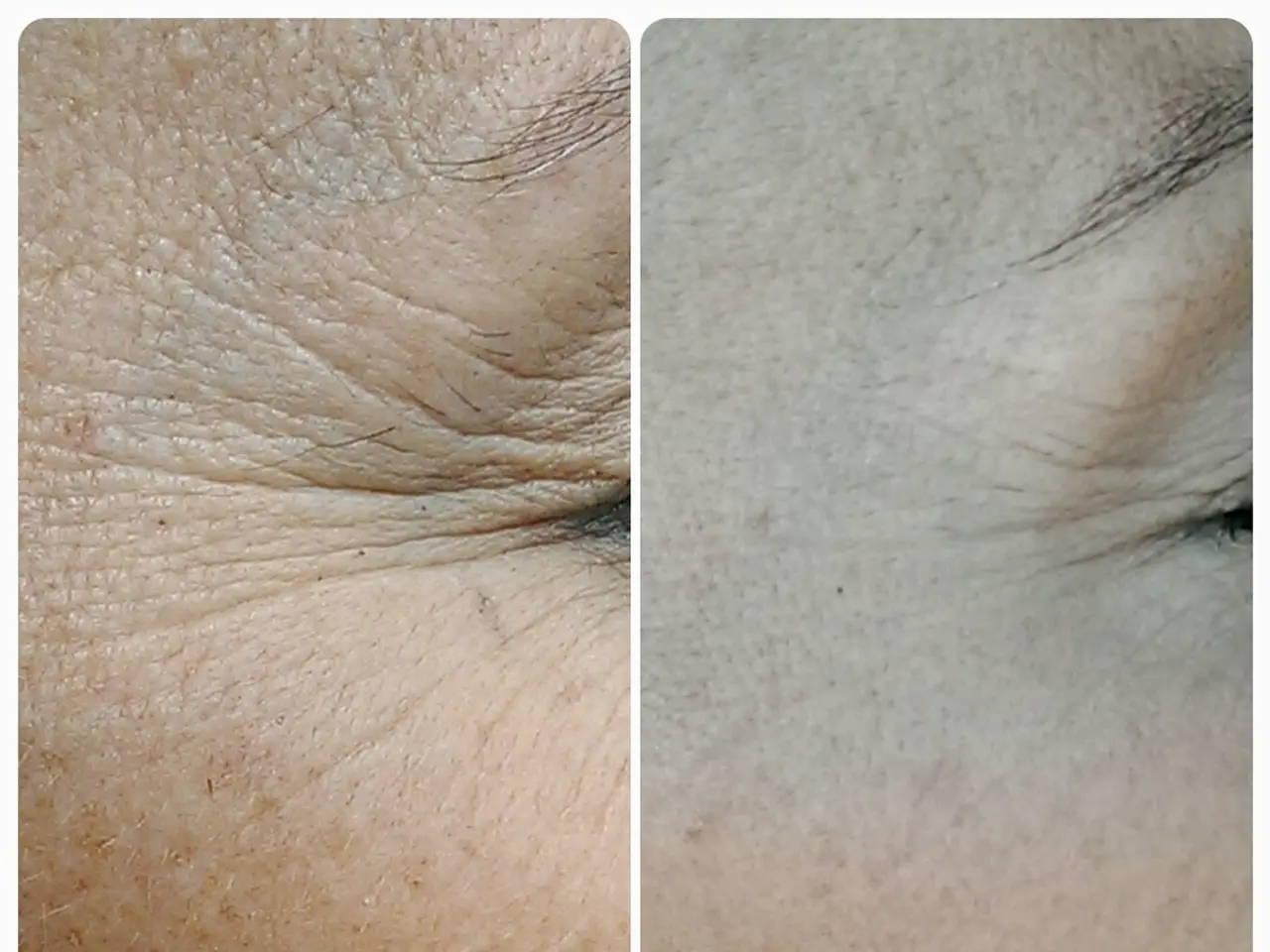Is Hyaluronic Acid Beneficial for Delicate Skin?
Hyaluronic acid, a naturally occurring substance in the body, is known for its remarkable hydrating properties. Found in the skin, connective tissues, and eyes, it helps retain moisture and keep tissues lubricated [1]. This makes it an ideal ingredient for skincare products, particularly those aimed at sensitive skin.
Hyaluronic acid is widely used in skincare due to its ability to retain moisture and improve skin elasticity. It is lightweight and non-greasy, which allows it to prevent the clogging of pores and the exacerbation of skin issues [2]. Moreover, it has soothing properties that help calm irritated skin and reduce redness [3].
Safety and Precautions for Sensitive Skin
Hyaluronic acid is generally safe for sensitive skin and is well tolerated across all skin types, including sensitive, atopic, and redness-prone skin [1][4][5]. Adverse reactions are very rare but may include mild redness or an allergic reaction in sensitive individuals [1].
When using hyaluronic acid on sensitive skin, a few best practices should be followed:
- Apply to damp skin: This helps hyaluronic acid bind moisture instead of drawing it out from deeper layers, reducing the risk of dryness or irritation [2][4].
- Pat gently: Vigorous rubbing should be avoided, especially if the skin is already sensitive or compromised due to acne treatments or other actives [2].
- Allow absorption time: Before layering other products, give hyaluronic acid some time to be absorbed to prevent trapping ingredients against the skin, which can cause irritation or breakouts [2].
- Use lower concentrations when starting out: Especially if sensitive, introduce hyaluronic acid gradually into your routine, e.g., once a day or every other day [3].
- Patch test new products: This helps detect potential allergies or sensitivities [3].
- Seal with a non-comedogenic moisturizer: After applying hyaluronic acid, lock in hydration and protect the skin barrier [2].
When combining with active ingredients like vitamin C or benzoyl peroxide, hyaluronic acid is generally safe and can improve tolerance but should be introduced carefully to monitor for irritation [2][3].
Benefits for Sensitive Skin
Hyaluronic acid is effective in hydrating and soothing sensitive skin without causing adverse reactions. It helps deeply hydrate the skin without causing irritation and significantly reduces inflammation and soothes irritated skin [6].
Moreover, hyaluronic acid reduces the appearance of fine lines and wrinkles, contributing to a more youthful and vibrant complexion [7]. It can be layered with other skincare products, but it is important to avoid combining it with harsh ingredients [8].
Common triggers for sensitive skin include environmental factors, harsh chemicals, allergens, fragrances and dyes, stress, and hormonal changes [9]. Products containing strong acids, alcohol, or fragrances should be used cautiously or avoided altogether.
In summary, topical hyaluronic acid is safe and beneficial for sensitive skin when used correctly—damp skin application, gentle patting, gradual introduction, patch testing, and proper layering with moisturizers are key precautions to minimize any risk of irritation or adverse reactions [1][2][3][4].
[1] https://www.ncbi.nlm.nih.gov/pmc/articles/PMC6253262/ [2] https://www.ncbi.nlm.nih.gov/pmc/articles/PMC6099345/ [3] https://www.ncbi.nlm.nih.gov/pmc/articles/PMC6390096/ [4] https://www.ncbi.nlm.nih.gov/pmc/articles/PMC6038506/ [5] https://www.ncbi.nlm.nih.gov/pmc/articles/PMC6099345/ [6] https://www.ncbi.nlm.nih.gov/pmc/articles/PMC6253262/ [7] https://www.ncbi.nlm.nih.gov/pmc/articles/PMC6099345/ [8] https://www.ncbi.nlm.nih.gov/pmc/articles/PMC6099345/ [9] https://www.ncbi.nlm.nih.gov/pmc/articles/PMC6099345/
- Hyaluronic acid, a naturally occurring substance in the body, is popular in health-and-wellness and skincare routines due to its hydrating properties and its ability to improve skin elasticity, making it ideal for acne-prone skin and sensitive skin.
- When used on sensitive skin, hyaluronic acid is generally safe and well-tolerated, but it's important to follow safety practices such as applying to damp skin, patting gently, allowing absorption time, using lower concentrations when starting out, patch testing new products, and sealing with a non-comedogenic moisturizer.
- In addition to hydrating and soothing sensitive skin, hyaluronic acid can help reduce fine lines and wrinkles, contributing to a more youthful and vibrant complexion, but it should be layered with other skincare products cautiously to avoid harsh ingredients.4.Common triggers for sensitive skin include environmental factors, harsh chemicals, allergens, fragrances and dyes, stress, and hormonal changes, so products containing strong acids, alcohol, or fragrances should be used with care or avoided altogether.5.Science shows that hyaluronic acid can have significant benefits for sensitive skin, improving the skin's hydration levels and reducing inflammation and redness without causing adverse reactions, and it is an essential ingredient in many skincare products aimed at sensitive skin.
- A healthy diet rich in essential nutrients is important for maintaining healthy skin, and incorporating skincare products containing ingredients like hyaluronic acid and niacinamide can further support the skin's health and vitality.




